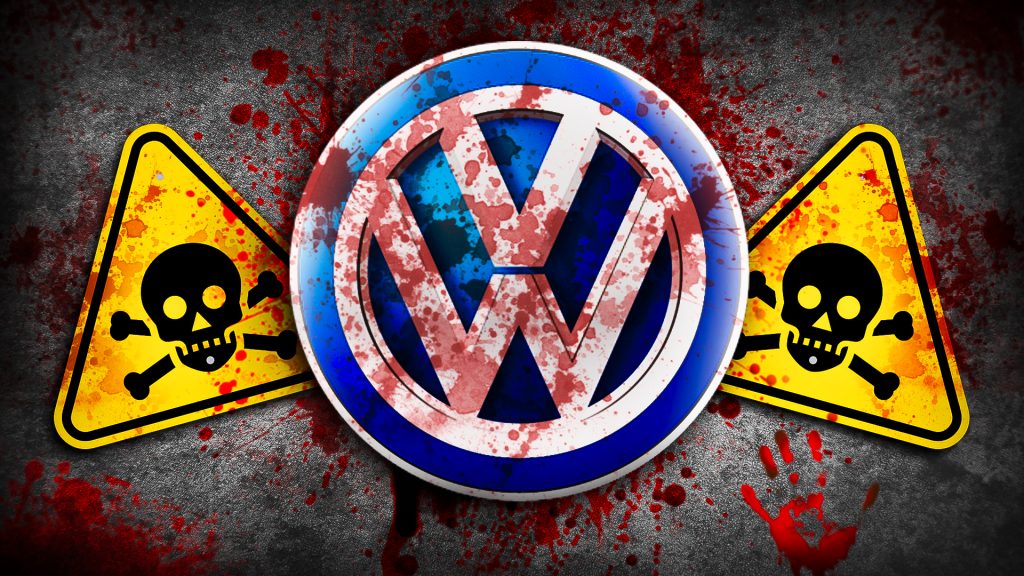Video Thumbnail:

Video Script:
Behind the façade of a trusted automaker, a sinister plot unfolds. Welcome to ‘The Evil Crimes of Volkswagen.’ In this dark saga, we unveil the shocking reality where deception reigns supreme.
In the autumn of 2015, a storm was brewing in the automotive world, one that would shake the industry to its core. It all began when the US Environmental Protection Agency (EPA) dropped a bombshell: Volkswagen, the revered car giant, had been playing a dangerous game. They had installed deceitful software, a cunning “defeat device,” in their diesel vehicles. This was no minor infraction. This device was a master of disguise, enabling these cars to appear eco-friendly in tests, while in reality, they were emitting a staggering 40 times the legal limit of nitrogen oxides during actual drives.
The repercussions were immediate and devastating. Volkswagen, once a symbol of reliability, now found its reputation in tatters. The shockwaves reverberated beyond Volkswagen, tarnishing the image of other German automotive titans. The industry saw a dramatic plunge in sales, a financial nightmare that translated to a staggering loss of 104,661 vehicles, valued at a jaw-dropping $5.2 billion, in 2016 alone.
But this was just the beginning. Volkswagen found itself drowning in a sea of legal battles and financial penalties, with costs soaring over $30 billion. This wasn’t just a scandal; it was the largest in the history of the automotive industry. The impact was far-reaching, stretching beyond mere numbers. It touched the lives of people in local communities, strained the livelihoods of auto dealers, and smeared the once-promising vision of “clean diesel.”
The Dieselgate scandal wasn’t just about cars and emissions. It struck at the very heart of public trust, not only in the automotive giants but also in the regulatory bodies meant to guard against such deceptions. It was a tale of ambition, deceit, and a fall from grace, a reminder of the fragile trust between the public and the pillars of industry.
Background
As the dust began to settle on the Dieselgate scandal, a deeper narrative emerged, one that delved into the very heart of Volkswagen’s existence and its intricate dance with power. This story traces back to the dark days of the late 1930s when none other than Adolf Hitler himself cast his gaze upon what would become the iconic Volkswagen Beetle. It was a beginning shadowed by a tumultuous history, a seed sown in times of war and ambition.
But fate had a twist in store. Post World War II, as the world was picking up its pieces, Major Ivan Hirst of the British army made a decision that would echo through the ages. Instead of laying waste to Volkswagen’s factory in Wolfsburg, he chose to breathe life into it. This act of salvation set the stage for an extraordinary saga. Volkswagen was not just any company; it was a phoenix rising from the ashes of war, marked by a unique ownership structure. With Lower Saxony holding a pivotal 20% of the shares and the influential Porsche and Piëch family controlling a majority stake, Volkswagen was more than a car maker; it was a symbol of resilience and innovation.
Yet, within this tale of triumph lay the seeds of a complex web of political and corporate intrigue. Volkswagen’s deep-rooted connections within the German political landscape were not just a ladder to success; they were a shield that allowed it to maneuver through regulations and maintain its dominance in the automotive world. The German stakeholder model, a tapestry of co-determination and labor representation, was supposed to be Volkswagen’s moral compass. However, this model, admired for its balance of power and interests, proved inadequate in preventing the looming crisis.
The diesel emission fiasco was not just a scandal; it was a mirror reflecting the pathways to corporate misdemeanors. Volkswagen’s entanglement with political and corporate actors, a relationship steeped in Germany’s political economy’s history, painted a picture of an entity too intertwined with power to discern right from wrong. It was a network so intricate that it blurred the lines between corporate governance and political maneuvering.
The company’s approach to the European Union’s regulations was not just about lobbying; it was a ballet of influence and persuasion, where political connections were leveraged to soften the blows of stringent laws. This dance with power, this mingling of corporate ambition with political leverage, perhaps provided Volkswagen with a skewed justification for its actions, a misguided belief in its invincibility.
As the world looked on, the story of Volkswagen’s rise, its fall, and its complex relationship with the powers that be, unfolded like a grand drama. It was a tale that went beyond cars, emissions, and regulations. It was a saga of power, influence, and the fragile nature of trust and integrity in the high-stakes world of global business.
The Scandal
As the tale of Volkswagen’s rise and complex interplay with power unfolded, a scandal of monumental proportions began to emerge, a drama that would shake the foundations of the automotive world and change the course of the company forever. This was “Dieselgate,” a saga marked by deception, discovery, and downfall.
The first whispers of trouble came in September 2015, when the US Environmental Protection Agency (EPA) made an announcement that sent shockwaves through the industry. Volkswagen, a name synonymous with trust and quality, had committed the unthinkable. The company had installed illegal software in its diesel vehicles, a brazen act of defiance against the Clean Air Act. As the EPA flexed its regulatory muscles, threatening not to certify Volkswagen’s 2016 diesels, the company was cornered into a confession. It admitted to programming its vehicles to cheat on emissions tests, triggering a recall of models dating back to 2009. The revelation sent Volkswagen’s stock into a nosedive, erasing a third of its value in mere days.
The heart of this deception lay in the “defeat device” software, a cunning piece of technology that transformed these vehicles into environmental chameleons. During testing, the software would spring into action, reducing emissions to meet legal standards. But once on the road, this facade would drop, allowing the cars to emit pollutants far above the legal threshold. The motive? Perhaps a quest for better performance or fuel efficiency. But the consequences were dire. It was the on-road testing in May 2014 that led the California Air Resources Board on a trail that would ultimately unveil Volkswagen’s deceit.
The fallout was catastrophic. Volkswagen found itself hemorrhaging financially and reputationally. The company was forced to earmark a staggering $10 billion for vehicle buybacks and owner compensation, acknowledging that they had misled consumers about their cars’ emissions. But that was just the beginning. A $14.7 billion civil settlement with the EPA and other agencies soon followed, a sum that cemented the scandal as one of the costliest in the automotive history. The repercussions extended beyond monetary losses. Seven current and former Volkswagen employees faced criminal charges, and the CEO, Martin Winterkorn, found his tenure unceremoniously ended in the scandal’s wake.
Dieselgate was more than a scandal; it was a narrative of hubris, deception, and a painful reckoning. It was a story that reverberated through boardrooms, governments, and the global market, a stark reminder of the perils of corporate greed and the importance of integrity in an era where the line between innovation and ethical responsibility is often blurred.
Impact
In the wake of Dieselgate, the full extent of the scandal’s consequences began to reveal itself, casting a long shadow not only over Volkswagen but also over the environment, public health, and the entire automotive industry. The use of “defeat devices” to cheat emissions tests had far more profound implications than just corporate misconduct; it was a transgression that echoed through ecosystems, communities, and marketplaces.
The environmental impact was immediate and alarming. The excessive pollutants released by Volkswagen’s vehicles, a toxic cocktail of particulate matter and harmful gases, began to take their toll on the air we breathe. This surge in pollution was not just a statistic; it was a tangible threat, exacerbating lung and heart conditions, fuelling the formation of smog, and undermining efforts to combat climate change. The skies, once a symbol of limitlessness, were now marred by the consequences of deceit.
But the repercussions extended beyond the environment. The scandal struck at the very heart of public health, particularly affecting the most vulnerable. Research painted a grim picture: thousands of children were born with lower birth weights, a direct result of the increased pollution, and acute asthma rates in infants and children spiked alarmingly. It was a sobering reminder that the actions of corporations can ripple out in profound and personal ways, touching lives far removed from boardrooms and balance sheets.
The automotive industry, too, reeled from the shockwaves of the scandal. Volkswagen, once a beacon of German engineering and reliability, saw its reputation tarnished, its sales plummeting. But the impact didn’t stop at Volkswagen’s doorstep; it spread to other German carmakers, tainting their collective image and leading to significant financial losses. The scandal raised uncomfortable questions about the credibility of the entire “clean diesel” initiative, casting a long shadow over other European manufacturers.
For Volkswagen, the risks were both tangible and intangible. The company faced a staggering financial burden, with fines and damages exceeding $30 billion. More insidiously, the scandal eroded the trust Volkswagen had spent decades building, leaving a brand once associated with reliability and integrity in tatters. The shift towards e-mobility and a concerted effort to rebuild its brand were not just strategic moves; they were acts of survival, attempts to navigate the perilous waters of a scandal that had shaken the very foundations of one of the world’s leading automakers.
So, as Volkswagen turns the key towards redemption, what do you think? when it comes to corporate integrity, are some companies just running on empty promises? Let us know in the comment box below.
Summary:
Volkswagen’s Dieselgate scandal, a tale of deception and downfall, began with the revelation of ‘defeat devices’ in their diesel vehicles, circumventing emission tests. This exposed the automaker’s breach of trust and environmental standards, leading to significant financial and reputational damage. Originating from a company with a history intertwined with political power, the scandal unraveled, highlighting the company’s manipulation of regulations. The fallout included environmental harm, public health risks, and a shaken automotive industry. Volkswagen’s journey from innovation to deceit serves as a stark reminder of the consequences of corporate misconduct.
For Volkswagen, the risks were both tangible and intangible. The company faced a staggering financial burden, with fines and damages exceeding $30 billion. More insidiously, the scandal eroded the trust Volkswagen had spent decades building, leaving a brand once associated with reliability and integrity in tatters.












